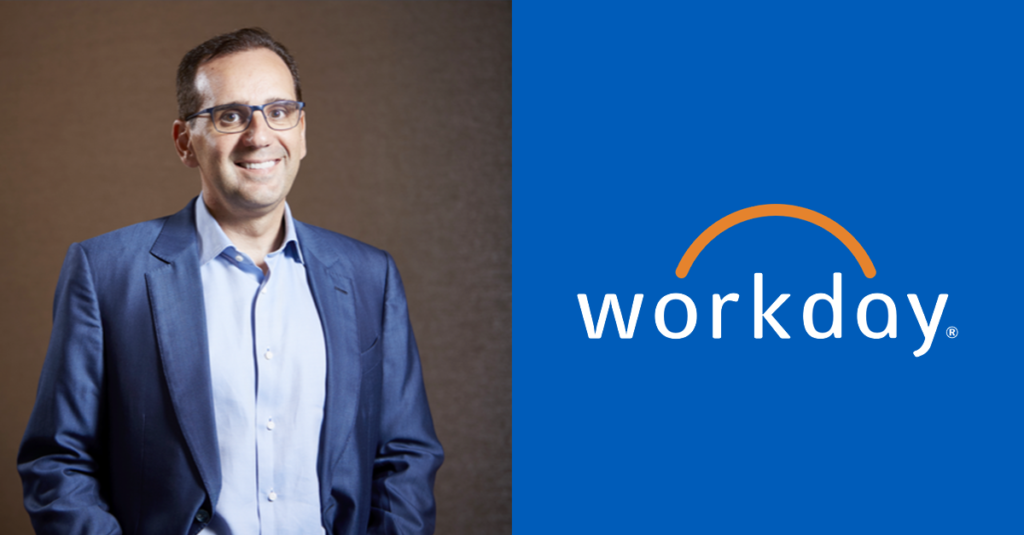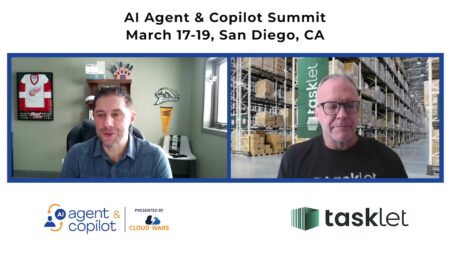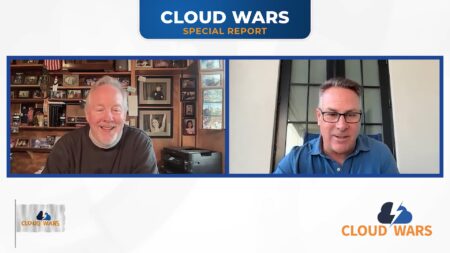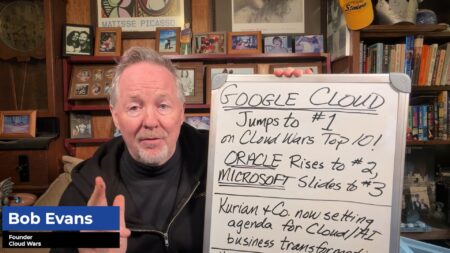As Workday expects CFO spending on financial applications to rise dramatically, the company believes that advanced-technology approaches to finance and operations will give CFOs better insights and more flexibility than ever before.
On my weekly Cloud Wars Top 10 rankings, Workday is #8.
Traditional finance tools, often part of a large suite of applications, were sturdy workhorses in the good old days until about 10 or so years ago when customer-driven demands and expectations began to roil the global economy.
But in today’s customer-centric digital economy, those monolithic applications are simply unable to offer the flexibility and end-to-end interconnectedness that CFOs require, Workday co-CEO Chano Fernandez said in a recent interview.
“Today, the pace of business, the pace of change, the new types of business models and new types of go-to-market strategies—legacy systems just can’t cope with all of that,” Fernandez said during our Zoom call.
“You can have innovative ideas, but those legacy systems make it super-hard to implement those ideas, to have a productive experience, and to automate what needs to be automated,” Fernandez said.
“So CFOs are saying that with the pace of innovation they need to have and with the demands of digital transformation, it is now time to automate and innovate.” (For more on that, please check out CFOs Finally Ready to Surge into the Cloud: Workday co-CEO Bhusri.)
Into this breach, Workday is offering a different approach via its cloud-based Accounting Center solutions, which were introduced late last year and give CFOs the ability to transform data from legacy ERP systems into real-time financial insights.
Now, if you look only at the name itself—“Accounting Center”—I gotta say it’s not easy to get particularly excited. But beyond that plainer-than-vanilla name, Workday Accounting Center gives CFOs unprecedented flexibility to bulldoze operational and informational silos and gain visibility across the organization.
And while Fernandez and I discussed a variety of subjects in our 45-minute conversation, we kept coming back to the unique levels of customer value that Accounting Center can deliver.
The timing is particularly ripe, he added, because not only do businesses have a glaring need to boost the level of insights, speed and optimal decision-making from the office of the CFO, but many are also in the midst of a generational change in leadership.
“There’s no question that a lot of CFOs today have lived through some very tough legacy ERP implementations—some taking as long as 5 years—and with everything going on in the world today, when they think about trying to do another one, they decide, ‘Not on my watch!’
“But at the same time, there are a lot of new people coming into key roles in the office of the CFO and they simply expect different experiences around data and information,” Fernandez said. “They want and expect different capabilities to allow them to have real-time insights—they know that’s what’s needed today.”
Workday believes that Accounting Center can serve as not only an alternative to that “not on my watch” syndrome but also that dependable source of real-time data and insights demanded by new leaders in the finance organization.
“Accounting Center allows them to bring data from operations—from any third-party ERP or operational system—into core accounting systems,” Fernandez said.
Since Accounting Center is built on Workday’s analytics engine, it can not only pull in that operational data, but also enrich it in proper finance and accounting contexts and allow businesses to achieve the critical goal of reducing their time to close.
That built-in ability to do analytics is essential in today’s fast-paced world, Fernandez said.
“This past year, we’ve seen customers do 30X more planning scenarios than they’ve done in the past,” he said, emphasizing that the differential is 30X, not simply 30%.
“And this allows the customer to look at their whole business from a 360-degree view rather than in fragments. And by automating as much as possible, that makes the finance function as intelligent as possible, where they can spend less time trying to figure out what happened in the past and instead look at real-time exceptions such as anomalies.”
So while competitors SAP and Oracle push the notion of cloud ERP as the best way for businesses to get an end-to-end view, Fernandez believes that customers have a better alternative. That is, let those big legacy transactions keep cranking away at what they do best, and use Accounting Center to extract the data and infuse it into modern financial applications, enriched by analytical tools.
Asked about Workday’s insistence on refusing to call itself an ERP vendor, Fernandez offered some interesting perspectives on customer sentiment toward that venerable product category.
“No, we don’t care to call ourselves an ERP vendor because after all we don’t do ‘resource planning’—we don’t do manufacturing where resource planning is essential.
“Then there’s the idea that the term ‘ERP’ creates in the minds of lots of customers: long projects, cumbersome, difficult, purely transactional, and no analytics,” Fernandez said.
“So we think the better solution is to allow customers to keep the ERP systems they have, and give them the ability to do analytics and planning outside of that ERP system but using all the data from the ERP system.
“In that way, we’re not ERP—instead, we’re the enterprise-management cloud.”
RECOMMENDED READING
Has Salesforce Beaten Microsoft, Oracle & SAP to #1 in Industry Clouds?
CFOs Finally Ready to Surge into the Cloud: Workday co-CEO Bhusri
As Marc Benioff Torches Microsoft, the Cloud’s Unique Value Is Revealed
Microsoft CEO Nadella: Leaders Realized, ‘I Won’t Exist if I’m not in the Cloud’
Microsoft Acquisition Reveals Huge Ambitions for Red-Hot Industry Clouds
SAP Rejects Larry Ellison Claims of Customer Turmoil: ‘Demand Is Exploding’
How Oracle Won 100+ Cloud Deals from SAP: a Chat with Steve Miranda
Oracle CEO Safra Catz: 6 Reasons to Be Bullish on Oracle Cloud
Subscribe to the Cloud Wars Newsletter for in-depth analysis of the major cloud vendors from the perspective of business customers. It’s free, it’s exclusive and it’s great!










